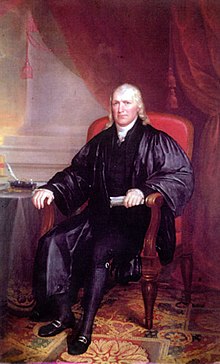Samuel Chase
| Samuel Chase | |
|---|---|
 |
|
| Associate Justice of the Supreme Court of the United States | |
|
In office January 27, 1796 – June 19, 1811 |
|
| Nominated by | George Washington |
| Preceded by | John Blair |
| Succeeded by | Gabriel Duvall |
| Personal details | |
| Born |
April 17, 1741 Somerset County, Maryland, British America |
| Died | June 19, 1811 (aged 70) Baltimore, Maryland, U.S. |
| Political party | Federalist |
| Spouse(s) | Ann Baldwin |
| Signature | |
Samuel Chase (April 17, 1741 – June 19, 1811) was an Associate Justice of the United States Supreme Court and earlier was a signatory to the United States Declaration of Independence as a representative of Maryland. Early in life, Chase was a "firebrand" states-righter and revolutionary. His political views changed over his lifetime, and, in the last decades of his career, he became well known as a staunch Federalist and was impeached on grounds of letting his partisan leanings affect his court decisions. He was acquitted by the Senate and remained in office.
Samuel Chase was the only child of the Reverend Thomas Chase (c. 1703 – 1779) and his wife, Matilda Walker (? – by 1744), born near Princess Anne, Maryland.
His father was a clergyman who immigrated to Somerset County to become a priest in a new church. Samuel was educated at home. He was eighteen when he left for Annapolis where he studied law under attorney John Hall. He was admitted to the bar in 1761 and started a law practice in Annapolis. It was during his time as a member of the bar that his colleagues gave him the nickname of "Old Bacon Face."
In May 1762, Chase married Ann Baldwin, daughter of Thomas and Agnes Baldwin. Samuel and Ann had had three sons and four daughters, with only four surviving to adulthood. Ann died in 1776.
In 1784, Chase traveled to England to deal with Maryland's Bank of England stock, where he met Hannah Kilty, daughter of Samuel Giles, a Berkshire physician. They were married later that year and had two daughters, Hannah and Elisa.
In 1762, Chase was expelled from the Forensic Club, an Annapolis debating society, for "extremely irregular and indecent" behavior.
In 1764, Chase was elected to the Maryland General Assembly where he served for twenty years.
In 1766, he became embroiled in a war of words with a number of loyalist members of the Maryland political establishment. In an open letter dated July 18, 1766, Chase attacked Walter Dulany, George Steuart (1700–1784), John Brice (1705–1766) and others for publishing an article in the Maryland Gazette Extraordinary of June 19, 1766, in which Chase was accused of being: "a busy, reckless incendiary, a ringleader of mobs, a foul-mouthed and inflaming son of discord and faction, a common disturber of the public tranquility". In his response, Chase accused Steuart and the others of "vanity...pride and arrogance", and of being brought to power by "proprietary influence, court favour, and the wealth and influence of the tools and favourites who infest this city."
...
Wikipedia
